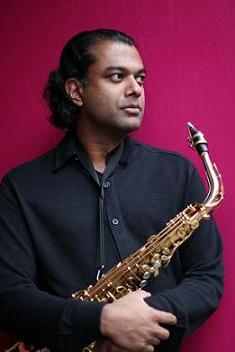Rising Jazz Star in Millennium Park (FREE!)
By Alexander Hough in Arts & Entertainment on Aug 5, 2009 6:20PM

Photo by Mark Duggan, White Noise Visuals
What has everyone a-tizzy is his melding of jazz and South Indian music. Attempts at this combination have been made prior to Mahanthappa, but the results were either superficial tokenism or bad music, and very often both. The reason for the difficulty goes beyond the geographic distance that kept the cultures apart (as opposed to the proximity that led to Latin jazz). South Indian music consists only of melody and rhythm, whereas jazz is primarily harmony. Mahanthappa was able to finally bridge the gap.
Mahanthappa came to Indian music reluctantly. Raised in Boulder, Colorado, he studied jazz at the University of North Texas and the Berklee College of Music, but there was a constant expectation that he play an Indian-jazz hybrid. People even insisted they heard Indian influences in his playing, an opinion Mahanthappa says was based entirely on the color of his skin. While in college, Mahanthappa's brother gave him an album by Kadri Gopalnath called "Saxophone Indian Style," which he meant as a gag gift (Mahanthappa says Indian musicians are notoriously lousy at coming up with album names). The music, however, was revelatory; Gopalnath played authentic Indian music, sliding notes and all, with his saxophone. Mahanthappa eventually traveled to India to study South Indian music and to work with Gopalnath, and the two saxophonists collaborated on "Kinsmen."/em>
Mahanthappa's Indian-jazz fusion is successful because it's sounds disarmingly natural. It's not just Indian instruments playing jazz; Mahanthappa has found an intersection of the styles that cheapens neither. Mahanthappa's playing and writing also effortlessly combine disparate elements: his sound is technically impressive yet lyrical, and the songs are intricate and deliberate yet catchy.
Joining Mahanthappa on tomorrow's concert will be seventy-four-year-old alto saxophonist Bunky Green. Green, who spent nearly thirty years living in Chicago, is best known as an educator - he currently teaches at the University of North Florida in Jacksonville - but he's spent his whole life performing, mostly with his own band, although he also spent time playing with Elvin Jones, Sonny Stitt, and Clark Terry. Mahanthappa's Chicago Legacy Ensemble will round out Thursday night's group, featuring Tito Carrillo (trumpet), Ryan Shultz (bass trumpet), Ron Perrillo (piano), François Moutin (acoustic bass), and Eric Montzka (drums).
The concert is part of the "Made in Chicago" concert series put on by the Department of Cultural Affairs and the Jazz Institute of Chicago, which features jazz musicians with Chicago connections (Mahanthappa got a graduate degree from DePaul). The free series continues every Thursday through September 3.
Jay Pritzker Pavilion in Millennium Park, Thursday, August 6, at 6:30 p.m., FREE<